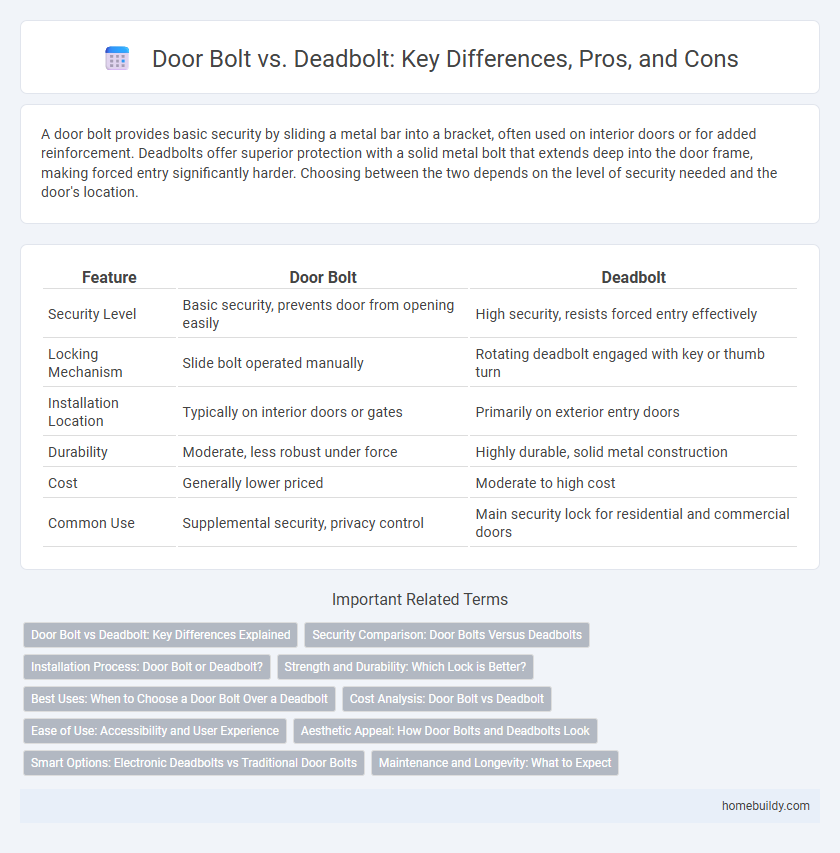A door bolt provides basic security by sliding a metal bar into a bracket, often used on interior doors or for added reinforcement. Deadbolts offer superior protection with a solid metal bolt that extends deep into the door frame, making forced entry significantly harder. Choosing between the two depends on the level of security needed and the door's location.
Table of Comparison
| Feature | Door Bolt | Deadbolt |
|---|---|---|
| Security Level | Basic security, prevents door from opening easily | High security, resists forced entry effectively |
| Locking Mechanism | Slide bolt operated manually | Rotating deadbolt engaged with key or thumb turn |
| Installation Location | Typically on interior doors or gates | Primarily on exterior entry doors |
| Durability | Moderate, less robust under force | Highly durable, solid metal construction |
| Cost | Generally lower priced | Moderate to high cost |
| Common Use | Supplemental security, privacy control | Main security lock for residential and commercial doors |
Door Bolt vs Deadbolt: Key Differences Explained
Door bolts are surface-mounted locking devices that slide a metal bolt into a corresponding slot to secure doors, offering quick and easy locking mainly for internal use. Deadbolts, built with a solid metal bolt that extends deeper into the door frame, provide superior security against forced entry and are typically used on exterior doors. The key difference lies in deadbolts' enhanced resistance to picking and physical attacks, making them a preferred choice for main entry points compared to door bolts.
Security Comparison: Door Bolts Versus Deadbolts
Deadbolts offer superior security compared to standard door bolts due to their complex locking mechanism, which resists forced entry and lock picking. Door bolts, often surface-mounted and simpler in design, provide additional reinforcement but are generally easier to bypass. For enhanced home security, deadbolts are preferred, especially when installed as single-cylinder or double-cylinder variants with hardened steel components.
Installation Process: Door Bolt or Deadbolt?
Installing a door bolt typically involves drilling fewer holes and aligning a sliding bolt mechanism, making the process quicker and less complex compared to a deadbolt. Deadbolt installation requires precise alignment of the bolt with the strike plate and often involves reinforcing the door frame for enhanced security. Choosing between the two depends on the desired security level and the complexity one is willing to handle during installation.
Strength and Durability: Which Lock is Better?
Deadbolts offer superior strength and durability compared to door bolts due to their solid metal construction and deeper locking mechanism that extends into the door frame. Door bolts are generally easier to install and provide additional security but lack the robustness of deadbolts against forced entry. For maximum security, deadbolts are preferred in residential and commercial applications where resistance to tampering and impact is critical.
Best Uses: When to Choose a Door Bolt Over a Deadbolt
Door bolts provide effective security for interior doors, gates, and sliding doors where quick locking and unlocking are needed without a key. Ideal for securing areas that require frequent access or added reinforcement from the inside, door bolts are best for temporary or secondary security measures. Unlike deadbolts, which offer higher resistance against forced entry on exterior doors, door bolts excel in convenience and ease of operation for internal use.
Cost Analysis: Door Bolt vs Deadbolt
Door bolts typically cost between $10 and $30, offering a budget-friendly option for basic security needs, while deadbolts range from $40 to $100 or more, reflecting their enhanced security features. Installation costs vary, with door bolts often requiring simpler setups that homeowners can perform themselves, whereas deadbolts may need professional installation, adding $50 to $100 in labor fees. Evaluating total investment, door bolts suit cost-conscious users seeking minimal protection, whereas deadbolts represent a higher upfront expense justified by superior security and durability.
Ease of Use: Accessibility and User Experience
A door bolt provides quick and straightforward locking by sliding a metal bolt into a catch or bracket, offering easy accessibility without requiring a key. In contrast, a deadbolt often demands more deliberate action, including turning a key or thumb turn, which may slow user experience but increases security. For those prioritizing ease of use and convenience, especially in everyday access, door bolts enhance user experience with simple manual operation.
Aesthetic Appeal: How Door Bolts and Deadbolts Look
Door bolts typically feature a simpler, streamlined design that blends seamlessly with various door styles, offering a discreet hardware option that enhances the door's natural appearance. Deadbolts often have a bulkier, more prominent profile, which can serve as a visible security statement but may detract from minimalist or refined door aesthetics. Choosing between a door bolt and deadbolt depends on the desired balance between subtlety and visible security presence in a door's overall look.
Smart Options: Electronic Deadbolts vs Traditional Door Bolts
Electronic deadbolts offer advanced security features such as keyless entry, remote access, and integration with smart home systems, providing greater convenience and control compared to traditional door bolts. Traditional door bolts rely on manual locking mechanisms without digital functionality, making them simpler but less versatile for modern security needs. Smart electronic deadbolts often include tamper alerts and customizable access codes, enhancing security beyond the mechanical strength of standard door bolts.
Maintenance and Longevity: What to Expect
Door bolts require minimal maintenance, typically needing occasional lubrication to ensure smooth operation and prevent rust. Deadbolts, designed for enhanced security, often use more complex internal mechanisms that may require regular inspection and tightening to maintain functionality. Both offer long-lasting durability when properly maintained, but deadbolts generally provide greater resistance to wear due to their robust construction.
Door bolt vs deadbolt Infographic

 homebuildy.com
homebuildy.com